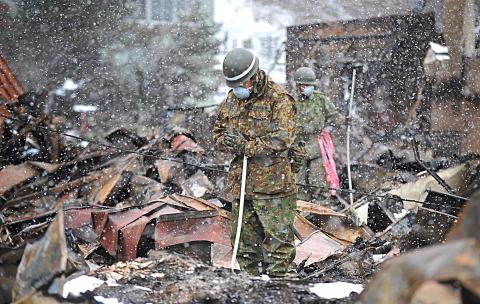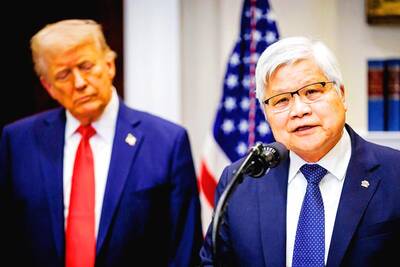Alarm over Japan’s nuclear disaster grew yesterday, with more foreign governments advising citizens to flee Tokyo as army helicopters dumped water on the overheating plant at the center of the crisis.
Six days after a massive earthquake and tsunami plunged Japan into its worst crisis since World War II, the US and Britain chartered flights for nationals trying to leave and China moved thousands of citizens to Tokyo for evacuation.
Commercial airline tickets were scarce and some companies hired private jets to evacuate staff. In Tokyo, the streets were quiet but calm as the Japanese, though deeply concerned, mostly remained stoic over the emergency.

Photo: AFP
At the stricken Fukushima Dai-ichi nuclear power plant, 250km from Tokyo, Chinook military helicopters dumped tonnes of water in a desperate bid to cool reactors crippled by the earthquake to prevent a catastrophic meltdown.
Fire engines were put into action to douse fuel rods inside reactors and containment pools submerged under water to stop them from degrading because of exposure to the air and emitting dangerous radioactive material.
“Based on what experts have told us, it’s important to have a certain level of water [in the pools] before we can start to see any positive effect,” chief government spokesman Yukio Edano told reporters.
The official toll of the dead and missing from the twin disasters, which pulverized the northeast coast, was approaching 15,000, police said, as aftershocks continued to rattle a jittery nation.
The number of confirmed dead stood at 5,457, with more than 80,000 buildings damaged and 4,798 destroyed, but as Japanese and international teams mounted a massive search and relief effort, reports from some battered coastal towns suggested the final death toll could be far higher.
Millions of people have been left without water, electricity, fuel or enough food and hundreds of thousands more are homeless, the misery compounded by heavy snowfalls, freezing cold and wet conditions.
Thick snow covered wreckage littering quake-hit areas, all but extinguishing hopes of finding anyone alive in the debris.
A cold snap brought heavy blizzards over the country’s northeast overnight, covering the tsunami-razed region in deep snow and vital highways in ice.
“We’re already seeing families huddling around gas fires for warmth,” Save the Children’s Steve McDonald said.
“In these sorts of temperatures, young children are vulnerable to chest infections and flu,” he added, estimating that the disaster had left 100,000 children homeless.
The tense nation also saw the stock market fall again yesterday, closing down 1.44 percent on fears about the economic impact.
The latest threat at the Fukushima Dai-ichi plant was the fuel-rod pools, which contain used rods that have been withdrawn from reactors, yet remain highly radioactive. They are immersed in cooling water for years until they shed enough heat to become manageable for storage.
Water in one of the pools was evaporating because of the rods’ heat and temperatures were slowly rising in two other pools because coolant pumps were knocked out by the quake and tsunami, experts said.
They warned that if the tanks run dry and leave the fuel rods exposed, the rods could melt or catch fire, creating potentially lethal levels of radiation.
At the same time, Japanese engineers were focused on restoring the power supply to the stricken power plant in an attempt to reactivate its cooling system.
“If the restoration work is completed, we will be able to activate various electric pumps and pour water into reactors and pools for spent nuclear fuel,” a spokesman for plant operator Tokyo Electric Power Co said.

ENDEAVOR MANTA: The ship is programmed to automatically return to its designated home port and would self-destruct if seized by another party The Endeavor Manta, Taiwan’s first military-specification uncrewed surface vehicle (USV) tailor-made to operate in the Taiwan Strait in a bid to bolster the nation’s asymmetric combat capabilities made its first appearance at Kaohsiung’s Singda Harbor yesterday. Taking inspiration from Ukraine’s navy, which is using USVs to force Russia’s Black Sea fleet to take shelter within its own ports, CSBC Taiwan (台灣國際造船) established a research and development unit on USVs last year, CSBC chairman Huang Cheng-hung (黃正弘) said. With the exception of the satellite guidance system and the outboard motors — which were purchased from foreign companies that were not affiliated with Chinese-funded

PERMIT REVOKED: The influencer at a news conference said the National Immigration Agency was infringing on human rights and persecuting Chinese spouses Chinese influencer “Yaya in Taiwan” (亞亞在台灣) yesterday evening voluntarily left Taiwan, despite saying yesterday morning that she had “no intention” of leaving after her residence permit was revoked over her comments on Taiwan being “unified” with China by military force. The Ministry of the Interior yesterday had said that it could forcibly deport the influencer at midnight, but was considering taking a more flexible approach and beginning procedures this morning. The influencer, whose given name is Liu Zhenya (劉振亞), departed on a 8:45pm flight from Taipei International Airport (Songshan airport) to Fuzhou, China. Liu held a news conference at the airport at 7pm,

KAOHSIUNG CEREMONY: The contract chipmaker is planning to build 5 fabs in the southern city to gradually expand its 2-nanometer chip capacity Taiwan Semiconductor Manufacturing Co (TSMC, 台積電), the world’s biggest contract chipmaker, yesterday confirmed that it plans to hold a ceremony on March 31 to unveil a capacity expansion plan for its most advanced 2-nanometer chips in Kaohsiung, demonstrating its commitment to further investment at home. The ceremony is to be hosted by TSMC cochief operating officer Y.P. Chyn (秦永沛). It did not disclose whether Premier Cho Jung-tai (卓榮泰) and high-ranking government officials would attend the ceremony. More details are to be released next week, it said. The chipmaker’s latest move came after its announcement earlier this month of an additional US$100 billion

Authorities yesterday elaborated on the rules governing Employment Gold Cards after a US cardholder was barred from entering Taiwan for six years after working without a permit during a 2023 visit. American YouTuber LeLe Farley was barred after already being approved for an Employment Gold Card, he said in a video published on his channel on Saturday. Farley, who has more than 420,000 subscribers on his YouTube channel, was approved for his Gold Card last month, but was told at a check-in counter at the Los Angeles International Airport that he could not enter Taiwan. That was because he previously participated in two